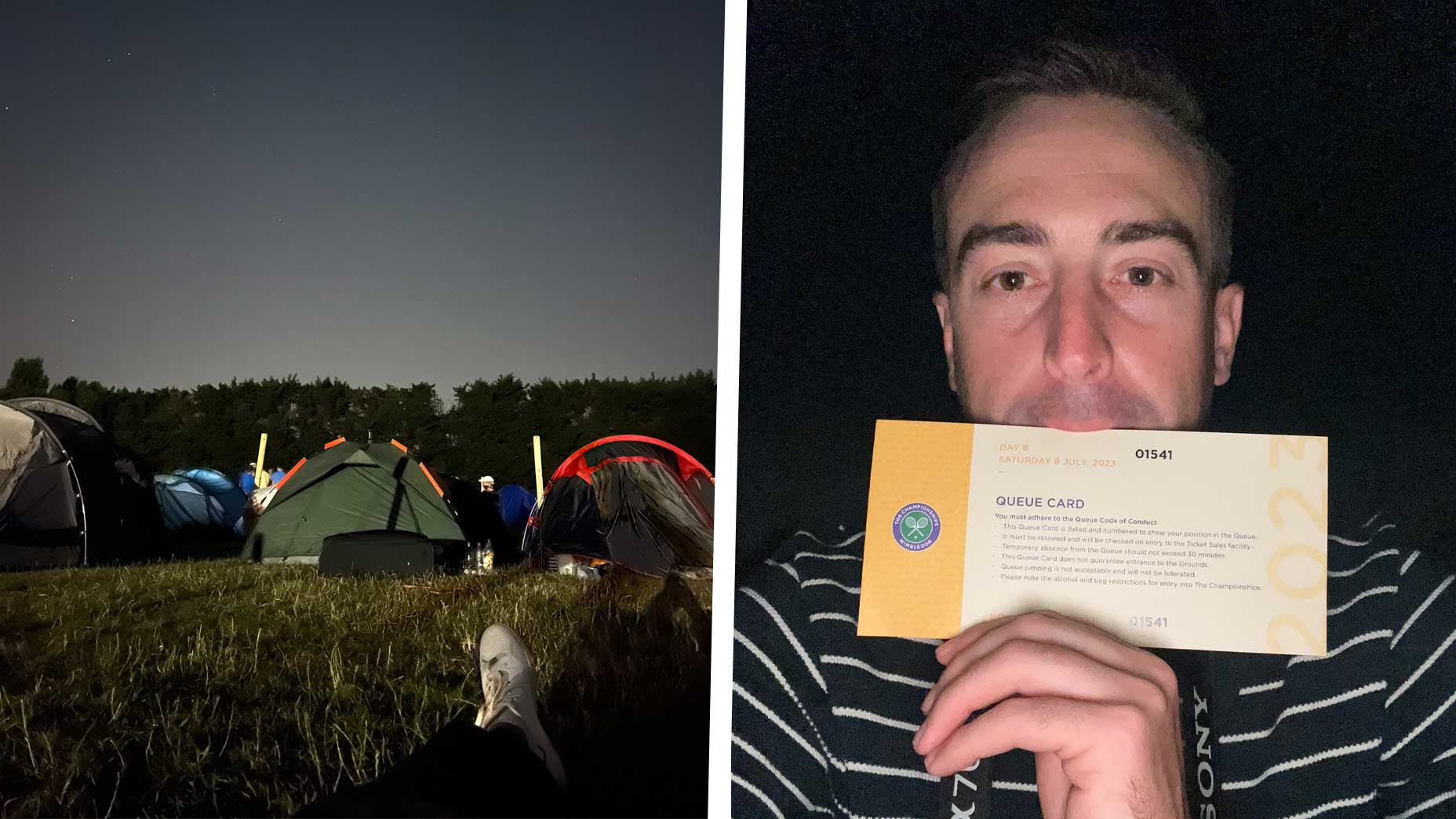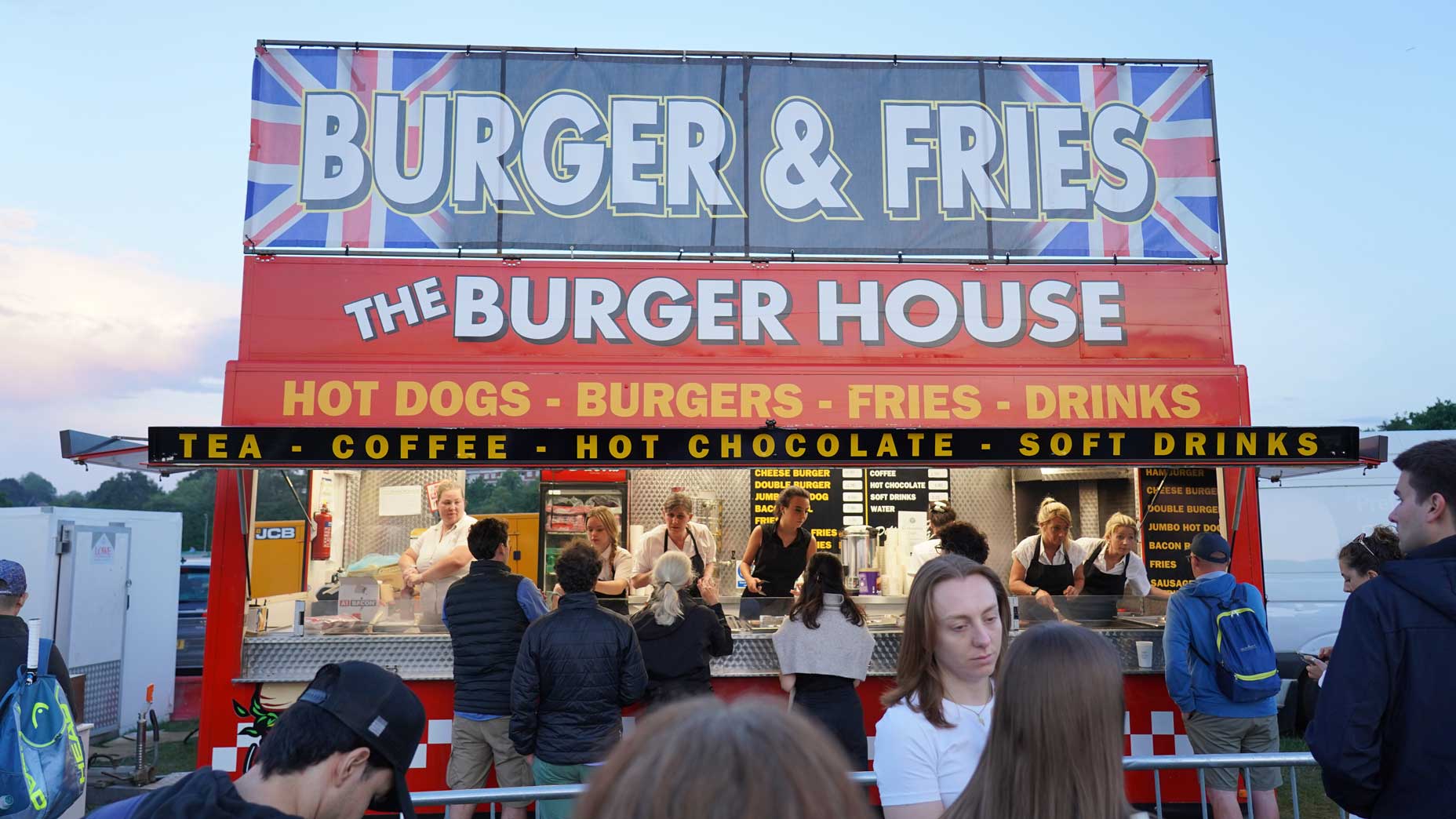
The midnight view from the Wimbledon queue.
Sean Zak
One year ago, two words could describe my attitude as I laid down on a patch of grass southwest of London just before midnight: jealous and annoyed. Annoyed with myself for packing so light and jealous of the woman to my left, looking all cozy zipped up in her red sleeping bag, a pillow under her head and over-ear headphones helping her rest.
I had been so confident and ignorant as I’d left home that night with only the must-haves: phone, wallet, AirPods, mobile charger. No pillow, no book, no water, no blanket. I had spotted this woman — seemingly a London resident — on the train and followed closely behind her cooler and backpack from the Southfields Station as she walked toward the All England Lawn Tennis Club in Wimbledon. We swam upstream against the giddy spectators, drunk on berries and cream and a straight-sets win for Novak Djokovic over Stan Wawrinka. We bobbed and weaved for 15 minutes through those lucky folks headed home to their plush mattresses before coming upon the entrance to The Queue, where we promptly received a notecard and direction to a 10’ x 10’ plot of turf: our spots in the nightly lineup to buy tennis tickets.
One thousand, five hundred thirty-nine people were ahead of us, which amounted to a snake of tents in a field. My train mate plopped down on the other side of a walkway from me and before long her eyes were closed, her hat pulled down tightly over her eyes, her red sleeping bag taunting me. She was a pro, and too far away from me for casual conversation. On my other side were two male friends who spoke only German between bites of sandwiches they made at home. They, too, didn’t waste much time, squeezing into their two-person tent and zipping it tight. It was late and even darker now, with lights from the Wimbledon grounds finally clicking off over the trees in the distance.
We were removed enough from London proper that you could actually see stars in the sky, but the temperature had dipped to 65 degrees and was approaching the dew point. The nearest bathroom was about 200 yards away. Nothing about my accommodation was going to be comfortable, but I had accepted my fate. I took off my belt and tucked it underneath my head for neck support. I yanked the draw string on my pullover tight as it could go, pressed play on a podcast and shoved my hands into my pockets to stay warm. I was jealous and annoyed. But I was excited, too. I was 10 hours away from a Wimbledon ticket.
MONDAY WAS DAY 1 OF a fancy little tennis tournament known as The Championships, Wimbledon. You know it better as, simply, Wimbledon, in the same way that a cute little golf tournament in April is known as The Masters and less The Masters Tournament.
Day 1 of Wimbledon implies a few things — namely, that the men’s and women’s singles competitions kick off. Naomi Osaka fought through a three-setter and won on a double fault. Carlos Alcaraz cruised through in three sets on Centre Court. The other, lesser-known implication of Day 1 at Wimbledon is that thousands of spectators arrived on Day 0, the night before, and camped out in a field with hopes of gaining access to the grounds. This year, more than 10,000 showed up overnight.
For those of us in America who get the pleasure of waking up to Coffee Tennis the next few weeks, we know the queue of fans sleeping overnight exists because, well, The Championships promotes it as a means to access one of the most sought-after tickets in sports. But also because there’s a very active Twitter/X account that comes alive every July. The handle is simple: @ViewFromTheQ.
Every few hours, @ViewFromTheQ updates its followers on how many people are already there waiting for tomorrow’s tennis tickets. The process is simple: Show up the night prior — first come, first served — and get in line. Bring whatever you can fit in a carry-on — tents can fit only two people — quiet hours begin at 10 p.m., and you can leave your spot for a maximum 30 minutes to use the loo or grab some grub. Pack up your goods around 6 a.m., get your wristband at 7:30, stand in line at 9 and within the next two hours you should be holding a ticket.
If you were among the brave ones, the first 500-ish to enter the queue the night before, you’ll get to buy a ticket to Centre Court. That’ll cost a couple hundred dollars. The next 500-600 will get tickets to Court 1 and the next 500-600 after that can gain access to Court 2. You can stay as long as you like that day, and you should take advantage. Regale yourself in the perfectly manicured grass and the energy of the assembled tennis faithful. Take a moment to drink a Pimm’s on The Hill in front of the big screen. Get comfy at your court or bop around to the others, which don’t require tickets. Watch the best players in the world practice, prep and even compete — listen to them grunt and shout and sigh! — from just a few feet away.
In other words, have the tennis experience equivalent to … Round 1 of the Masters at Augusta National.
The relationship between Augusta National Golf Club and the All England Lawn Tennis Club is not simply two sporting brands that respect each other from afar. There’s a genuine relationship between them — led in part by one man who is a member of both. But representatives from each club have traveled the 4,119 miles between Centre Court and the 1st tee at Augusta National to survey what each does to properly host its respective sporting worlds for a week or two every year. Unsurprisingly, there are plenty of similarities in the product, too. IBM and Rolex are major sponsor partners of both events. The interview area at Wimbledon was fashioned after the one at Augusta National. The food and drink at each is iconic. The attire worn by fans — and their hushed attention to when and how to cheer — is incredibly similar. Tennis players want to win Wimbledon in the same way golfers want to win the Masters. There’s no bigger tournament. And there’s no place fans of each would rather be.
Within that pursuit there’s a shared element of the haves and the have-nots. ANGC members and their guests can hang out in the clubhouse, or at other exclusive spots on the property (like the little cottage in the woods behind Amen Corner). The same applies to Wimbledon, where tea and lunch is on offer in the clubhouse and special guests can get cozy in the Royal Box. (A number of pro golfers have done so in recent years.) But what Wimbledon does extremely well, decidedly better than Augusta National, is crack open its exclusive doors just an extra inch or two for anyone who wants it badly enough.

Sean Zak
A year ago as a single 31-year-old man newly enamored with tennis and passing time in London before heading up to the Open Championship, I wanted it badly enough. So I tracked @ViewFromTheQueue all day long and left my rental at 11 p.m., getting very uncomfortable for just one night, knowing the best tennis-watching on earth was in my near future. It was a mostly restless evening, for obvious reasons, but also because I was doing some dreaming about what a queue would look like on the outskirts of the Masters.
At the moment, Augusta National’s system often rewards the uber-rich or the uber-lucky. Badges to the Masters can often be acquired via tour operators offering hospitality service and access to the grounds, but the price is always steep (read: thousands of dollars). Anyone passing through Augusta during tournament days will see scalpers on the side of Washington Road offering considerable amount of cash for badges, fully aware they can sell them to someone else and take a nice cut. There is, famously, the annual lottery system that ANGC hosts every summer. Later this month, golf fans will learn if their bids have been selected. Far more will end up disappointed than happy. To ANGC, that might be exactly the point. Demand is good. Predictable, reliable demand spurred on by scarcity and a little dash of hope is even better.
Wimbledon offers a similar lottery system — and perhaps with twice as many spectator days that event has a much simpler supply and demand curve. (Both clubs, it’s worth noting, are not hurting for ticket revenue.) But Wimbledon seems keenly aware that as one of the governing bodies in tennis, the sheer idea of telling people they can get affordable (if sleepless) tickets makes their tournament feel just a touch more egalitarian than the Masters does. Ticket demand for The Championships has reached unprecedented levels, chairwoman Debora Jevans said last month, but the queue offers Wimbledon another lever to pull. (Queuers can also enter a resale ticket-swap line that gives them a chance to pay discounted rates later in the day when spectators decide to leave for the day.)
Ticket demand for the Masters, one would expect, will perpetually hover in the same elevated position it has for decades. But what might it do for the tournament — and the sport at large — if the club worked to satiate that demand ever so slightly? The potential is there. As Augusta National Chairman Fred Ridley made clear during his press conference in April, the club is paying close attention to how it stages the Masters moving forward. This year, Ridley announced that the club would soon build accommodation for players, their families and support staff, as well as new underground parking for competitors. A year ago, Golf Digest reported club ambitions of housing media on-site, an enhanced fan village and even a Masters-specific highway off-ramp from nearby I-20.
Thanks to a seemingly bottomless operating budget, the bones are there to make it happen. Through a group of LLCs, the club has purchased property adjacent to its land for decades now. It also bought dozens and dozens of housing parcels to clear space for on-site parking at the Masters (and to help keep parking costs down for patrons) and business buildings across the street to create the new Map & Flag hospitality center so CEOs and CFOs can find some air-conditioning between their golf-viewing trips. This spring the club purchased a public park along its southeastern flank which, at the time, was one of the only parcels abutting that side of club property that the club didn’t own. Its new purpose, according to the local tax commissioner, is to aid with egress and parking during Masters week. When it comes to repurposing land to better run its tournament, Augusta National is 1 of 1. An overnight queue would represent a significant change in tournament operations, but the result would be well worth it.
To make it happen, ANGC would need significantly more staffing — just as Wimbledon employs Stewards to keep watch overnight. ANGC staffs its tournament in impeccable fashion with countless volunteers, but third shift is a different animal. They’d have to work within additional city ordinances, adhering to noise control for nearby residents. They would need bathrooms — showers, perhaps? — and daily storage just like Wimbledon does. They’d come up with their own set of rules, surely. No one quite makes rules like Augusta National. Chiefly, they’d have to think about just how many extra people they would want to allow onto its hallowed grounds. The daily number of Masters attendees is believed to be around 40,000. Could they find room — and maintain the same reverence for the experience — with a couple thousand extras?
The club also would need keep an eye out for dummies like me, showing up without a blanket or a pillow. But if we know anything about ANGC, we know they like to get creative. We know they enjoy upholding (and even importing) a standard of excellence that is unmatched — even by their friends across the pond. The sand in the bunkers — which players adore — comes from a special mine in North Carolina. One hundred-foot pines are brought in on 18-wheelers, fully grown. The chocolate chip and ice cream cookies come from Nashville. The olives served at the club are grown on a family farm in California. (Masters champions can’t get enough of them.) The best of the best, from all over. I can only imagine how Augusta National would set up its own version of a food-truck line, rewarding its most enthusiastic patrons with a proper Southern brekky.
As for the Wimbledon Queue, my fellow spectators-in-waiting arose to an affordable black coffee for £2.55 and bacon rolls for £7.50 apiece. Sports fans on the precipice of a dream coming true don’t need much, it turns out. They just want a way in.
The author welcomes your comments, concerns, ideas and any other notes at sean.zak@golf.com.

Sean Zak

